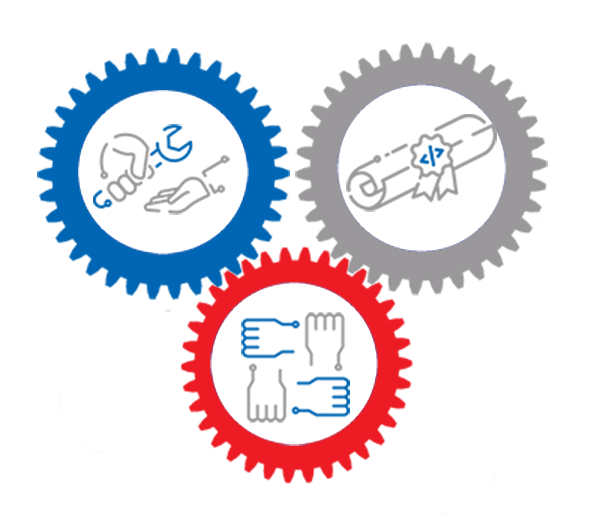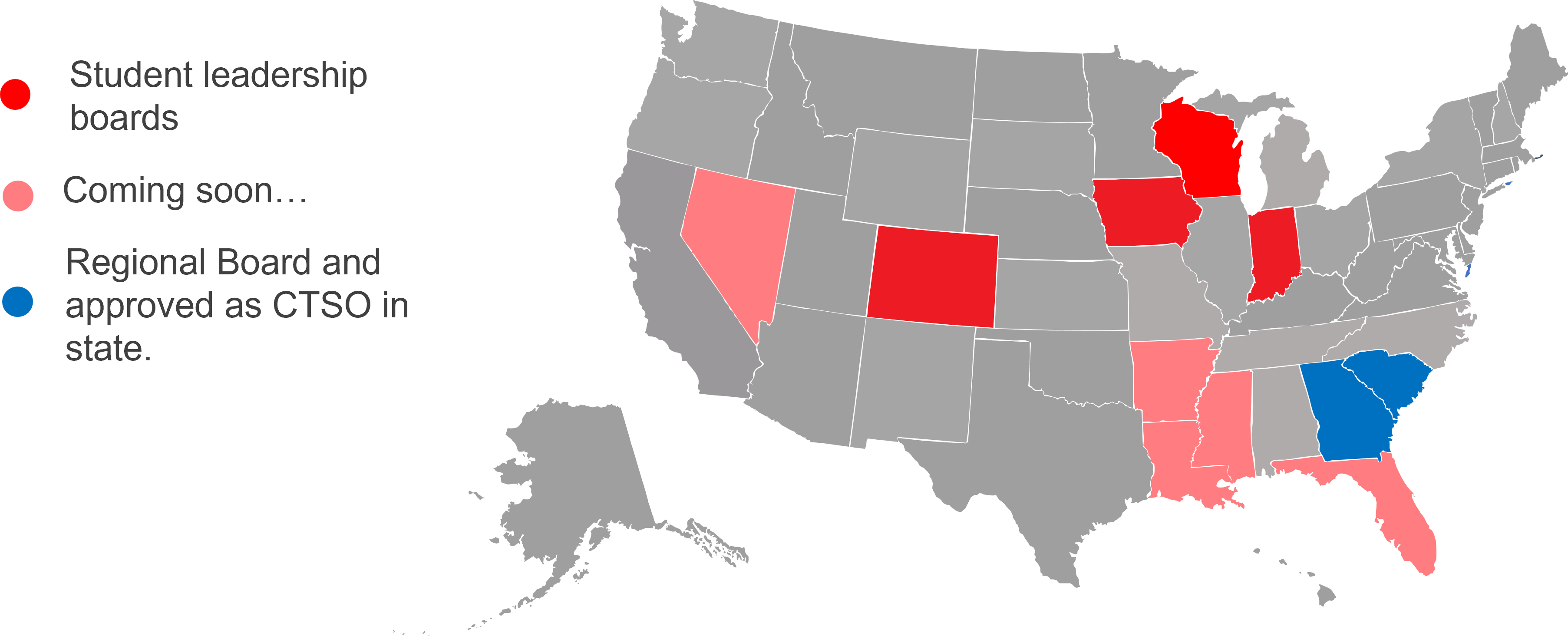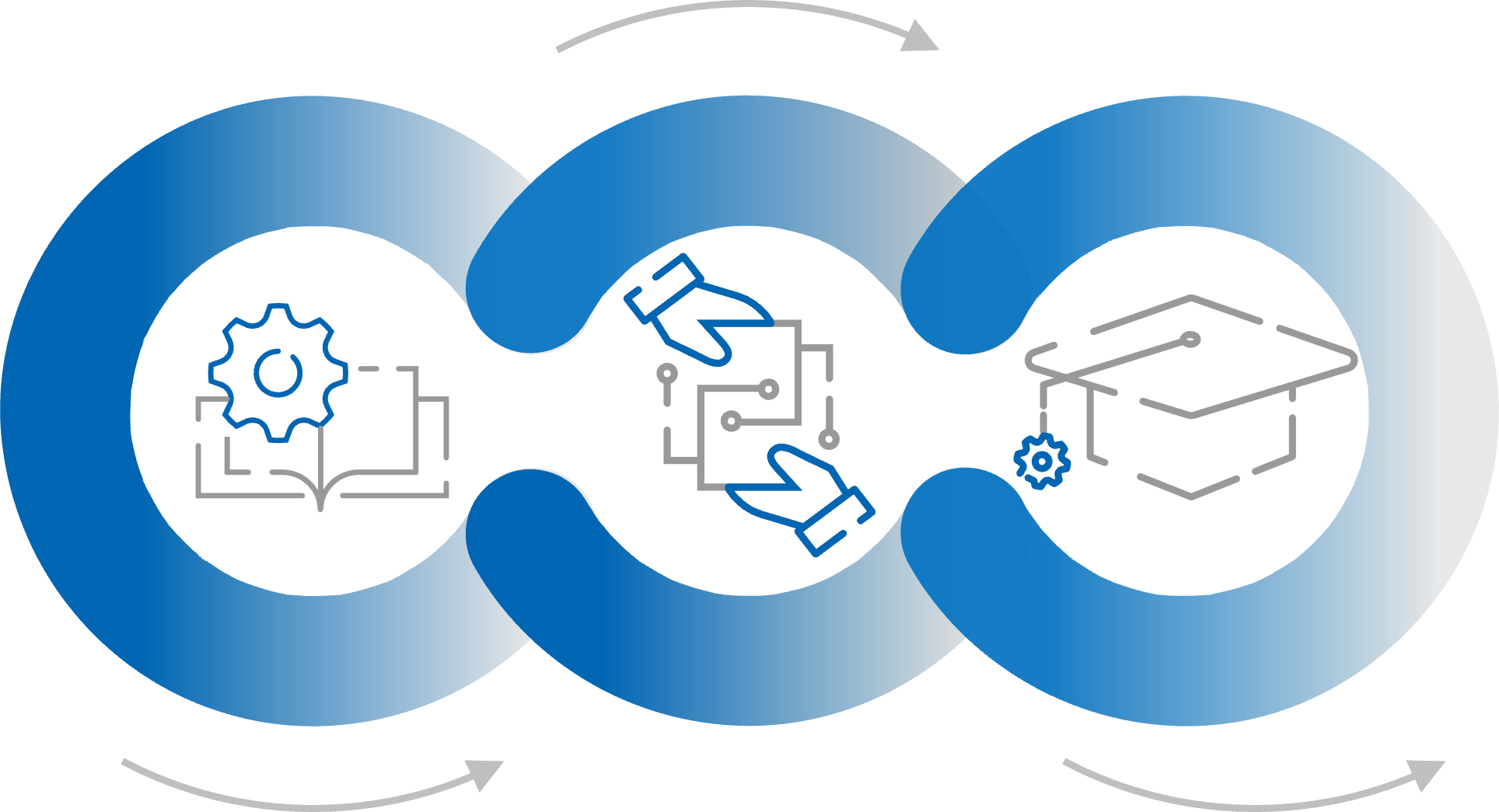FIRST provides opportunities for students to become well-rounded individuals encompassing student leadership, work-based learning, and career learning pathways. The combination of these opportunities are an essential part of Career and Technical Education.

Student Leadership
FIRST has several opportunities for students to be recognized and develop future leadership skills. At FIRST we embrace student's potential to develop leadership skills through
- Demonstrating leadership and commitment to FIRST Core Values
- Effectiveness at increasing awareness of FIRST in their school and community
- Interest in and passion for a long-term commitment to FIRST
- Overall individual contributions to their team
- Technical expertise and passion
- Entrepreneurship and creativity
- Ability to motivate and lead fellow team members
Students can obtain recognition through the FIRST Dean's List Award for FIRST Tech Challenge and FIRST Robotics Competition, as well as be involved in our expanding regional student leadership boards across the country. See the map below to see if there is one in your state. If there is not one in your state this blog How to Build A Youth Advisory Council gives some great tools to get started. Also, see the states where FIRST is recognized as a Career and Technical Student Organization. For information on starting a leadership board, and positioning FIRST as a Career and Technical Student Organization in your state please contact: firsteducation@firstinspires.org

FIRST Learning Pathways
A program of study is a sequence of courses that a student might take on a particular career path. When a student has tools and opportunities to support their career through academic and workforce integration, they can go into their career more prepared and with confidence. This could include a career path to go directly into the workplace, a post-secondary degree program, or a combination of these. FIRST programs can provide students with a unique integrated approach of academic achievement combined with work-based learning skills.

Engineering and Technology, Manufacturing, or Instructional Technology
FIRST Education is continuing to develop resources for classroom and independent learning that can help students and teachers utilize FIRST with course content that prepares them for advanced certification to prove knowledge and skills. In the remainder of this guide, you will find resources to develop your own program of study with example courses that teachers, students, and schools can use to implement FIRST into their school or independent learning program. We currently have example syllabi to support the following levels of courses which can be implemented across three different career clusters. Items with asterisk* will be available in the near future. Future syllabi will be available for pathways in career clusters specific to electronics, data analytics, and business and marketing.
Level 1
Click the title of each course description to view the course outline
Prerequisite – None
Equipment requirements – XRP Robot or FIRST Robotics Competition Kitbot, or FIRST Tech Challenge Competition Set
Engineering Exploration course provides students with experiences in engineering, robotics, coding, and game-based learning. FIRST revolves around a defined set of Core Values and gives students authentic, real-world learning experiences. Working as part of a team, students use what they learn in FIRST to research and design an innovative solution to a real-world problem. At the same time, teams build their own game-ready robot to show off at an event at the end of the course. Students practice 21st century skills like technical writing, presentation skills, communication, project management, collaboration, and teamwork. In the second semester of the course students apply their knowledge while developing a robot for the FIRST Team Competition.
Introduction to Engineering (FIRST Tech Challenge Class Pack Level 1)
Prerequisite – None
Equipment requirements – FIRST Tech Challenge Edubot or FIRST Tech Challenge Competition Set
Incorporate hands-on learning, career exploration, and workforce and industry-ready skills into your classroom or after-school curriculum using the FIRST Tech Challenge Class Pack curriculum and resources. In this yearlong course, students are given online access to curriculum, learning videos, and physics simulations. They spend time building the basic robot using a build guide and a mini-game competition provided with the curriculum. Then, they spend additional time understanding the game and developing a robot plan on how to design manipulators for the game. This approach gives students an introduction to the many different types of manipulators they might add to the robot and some of the basics of the physics required to design and build manipulators. They have a limited time to iterate the design before a competition. The Careers unit occurs at the end of the entire course for students who continue for a whole year. This approach gives students more time to develop mechanisms, design, and iterate.
Introduction to Programming (Java)
Prerequisite – None
Equipment requirements – XRP Robot or FIRST Robotics Competition Control System
In this course, students learn fundamental understanding of Java programming within WPILib and obtain widely applicable skills in programming that they can transfer to industry credentials. Students will learn fundamental programming concepts such as methods, objects, conditionals, loops, arrays, command-based programming and errors and troubleshooting. Students apply their knowledge to programming a robot that completes an obstacle course with feedback checkpoints. This course enables students to complete tasks with the XRP robot as well as the Romi. Students then can go on in the second semester to further their knowledge to prepare for the Java SE 8 Programmer Exam or an AP Computer Science Exam using external courses.
Work-Based Learning Level 1
See FIRST Tech Challenge or FIRST Robotics Competition Work-Based Learning Toolkits.
Level 2
Click the title of each course description to view the course outline
Prerequisite – FIRST Tech Challenge Class Pack Year 2
Equipment requirements – None
In this course, students utilize skills they have already gained to further develop skills in Engineering Principles. Students take a deeper dive into machines and mechanisms and the physics principles behind their robot design. They use iteration and the engineering design process to improve these principles and gain from their previous knowledge. Students can also take a deeper dive into programming skills utilizing Java as their programming language and learning additional skills about Industry 4.0 and Machine Learning with their robot and vision technology.
Prerequisite – Engineering Explorations
Equipment requirements – FIRST Robotics Competition Rookie Kit, FIRST Tech Challenge Competition Set, additional prototyping materials (plywood, 3D printers, stock aluminum etc.)
In this course, students learn the engineering design process to gain skills in engineering and fabrication. This course utilizes content aligned to both an OSHA Safety Certification and Associate CAD Certification of the teacher's choice. Students utilize project-based learning to lead students through the process of designing and fabricating mechanisms that can complete a task of picking up an object and transferring it to another location in two stages. They learn how to increase automation skills with the use of belts and sprockets, along with conveyor systems. The course ends with a class competition to determine which teams' mechanisms perform the best.
Industry 4.0 and Robotics Fundamentals
Prerequisite – Robotics Engineering Explorations or combination of Introduction to Programming and Introduction to CAD
Equipment requirements – XRP Robot or FIRST Tech Challenge Control System, 3D Printer, or other fabrication tools
In this course, students will develop an industrial style robot and learn knowledge that aligns to the SME Robotics Fundamentals and Manufacturing Certification. Students will design a class factory which makes promotional materials for your school. Groups in the class will utilize robots to automate the production process using manufacturing techniques and manufacturing style robots.
Work-Based Learning Level 2
See FIRST Tech Challenge or FIRST Robotics Competition Work-Based Learning Toolkits.
Level 3
Click the title of each course description to view the course outline
Prerequisite – Introduction to CAD and Engineering and Fabrication
Equipment requirements – Haas CNC Machine, or Mastercam CNC Machine
In this course, students learn the fundamentals of using CNC technology and develop skills with a CNC lath and CNC milling machine. As a FIRST program, students have access to certifications through our sponsors (Haas CNC Certification, Mastercam Certification, Driveworks Certification). The content in this course can be used as a pathway for students to gain the necessary skills for certification which can help them in the workforce while also gaining essential skills to fulfill their role on their FIRST Robotics Competition or FIRST Tech Challenge team. If instructors do not have access to the machines in their facility, they are encouraged to find a college or a testing facility for certifications that could provide the certification with their students.
Prerequisite – FIRST Tech Challenge Class Pack and Industry 4.0 Robotics Fundamentals
Equipment requirements – FIRST Robotics Competition Control System, FIRST Tech Challenge Control Systemobotics Fundamentals
Knowledge of basic algebra and complex numbers is assumed. Some introductory physics and calculus will be taught, as necessary.< br /> In this course, students take a deeper dive into engineering principles that affect robot performance and effectiveness through control systems and programming. The course is based on the Controls Engineering Textbook by Tyler Veness.
Machine Learning and Vision Processing
Prerequisite – Introduction to Programming with Java or another Java course
Equipment requirements – FIRST Robotics Competition Control System, FIRST Tech Challenge Control System, Vision processing cameras for the control system.
In this course, students learn the basics of Open CV using Python and Vision Processing. They will learn how to combine it with TensorFlow Object Detection and create their own data set to be used for machine learning.
Work-Based Learning Level 3
See FIRST Tech Challenge or FIRST Robotics Competition Work-Based Learning Toolkits.
Level 4
Click the title of each course description to view the course outline
Prerequisite – A minimum of two other courses in the pathway
Equipment requirements – None
In this course, students will choose to apply the knowledge they have learned in their previous courses to develop a solution to a community problem. They will research a problem in their community and develop and test the solution. They will present their solution to a business or organization.
Work-Based Learning
Students gain authentic, real-world problem solving through hands-on skill development. Industry technology and its experts expose students to skills and mindsets they will see in future industries. Industry mentors guide students in their learning and how it applies to students’ career pathways.
Classroom or Independent Learning
Classroom or Independent Learning
Students have a course content that prepares them for advanced certification to prove knowledge and skills.
Work-Based Learning
Work-Based Learning
Students need real-world application of knowledge applied to their future career including opportunities for internships and apprenticeships.
Confidence in Career Path
Confidence in Career Path
When students have applied learning and further developed their skills, they have confidence in their career path.
